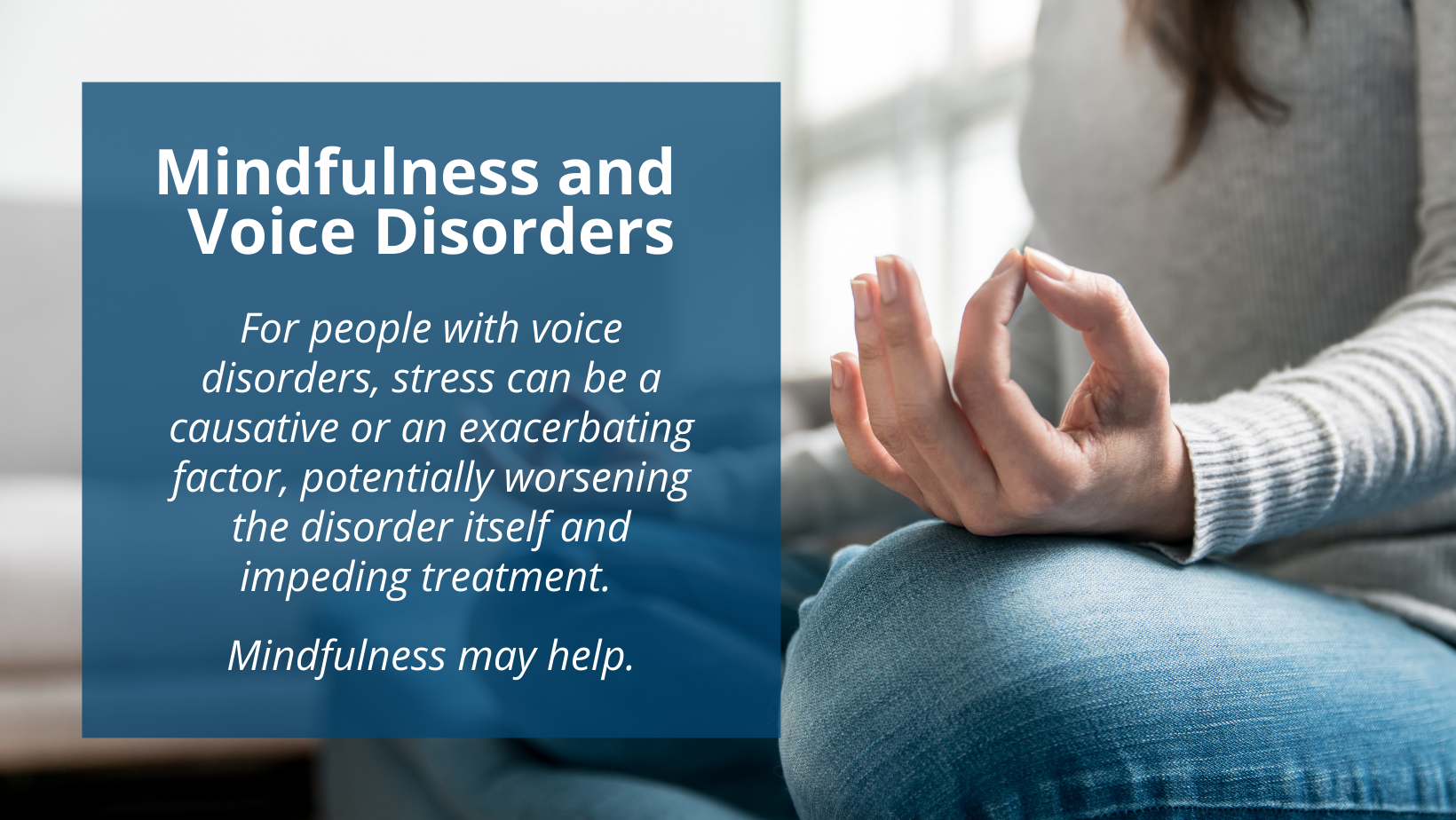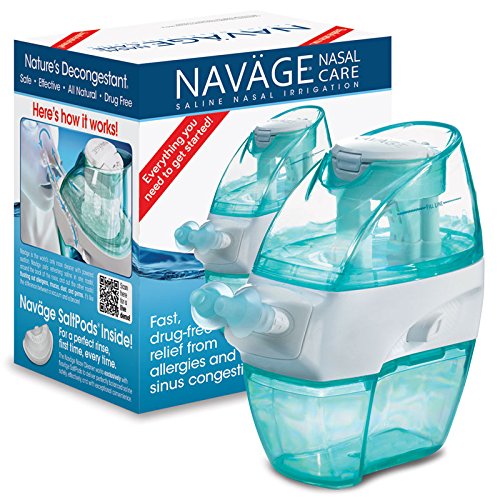For people with voice disorders, stress can be a causative or an exacerbating factor, potentially worsening the disorder itself and impeding treatment. People with voice disorders often experience high stress levels; social and emotional isolation; and loss, including the loss of work opportunities, sense of self, and the ability to communicate. Mindfulness meditation may help.
Article: Effects of an 8-Week Mindfulness Course in People With Voice Disorders
How to Find a Voice Specialist Speech-Language Pathologist
Most speech-language pathologists (SLPs) have very little experience and training in treating voice disorders. As part of their masters degree, SLPs are required to take one course in voice disorders — and that course may focus more on signs and symptoms than on treatment. If you’ve been diagnosed with a voice disorder, it is essential that you see an SLP who is well-versed in voice. But how can you know whether an SLPs has the experience to help you? This post will give you some ideas of what to look for or what questions to ask.
How to Find a Voice Doctor
Most doctors (even ENTs) don’t have the experience it takes to treat singers or anyone with a complex voice disorder. If you’re shopping for a voice-savvy ENT, look for an otolaryngologist who has completed a fellowship in Laryngology and the Care of the Professional Voice. There are just over 20 such fellowship programs in the United States. I recommend looking for a large hospital with a voice center that employs laryngologists and speech-language pathologists who specialize in voice. This blog post includes an extensive list. However, many regions of the country do not have a voice clinic, and you would be well-served by finding any fellowship-trained laryngologist. I recommend visiting the website of the American Laryngological Association, where you can search for members by location. The search feature does not function perfectly, but it provides a place to start.
Benefits of Group Mindfulness for People with Voice Disorders
Did you know that practicing mindfulness in a group has been shown to produce better outcomes than practicing alone? The popular press frequently touts the health benefits of mindfulness, but rarely states that those benefits are almost always gained in group settings. If you've been practicing mindfulness on your own using recordings or an app, consider joining a class instead.
Singing and Mindfulness Meditation: Complementary Practices
If you’re a singer who is new to meditation, figuring out where to start can be overwhelming. As a voice teacher and trained mindfulness instructor, I’d like to offer some insight. Let’s start by looking at four ways that singing and mindfulness can complement each other. Then I’ll share some valuable resources that can help you start your own meditation practice.
Study: Mindfulness for People with Voice Disorders
Nearly every modern textbook on vocal pedagogy, vocal health, or the causes and treatment of voice disorders recommends stress reduction as both a preventive and therapeutic tool for voice users and patients with voice disorders. We know from extensive research in various populations that Mindfulness Based Interventions (MBIs) can reduce stress. Yet I have been unable to find any studies on the effects of mindfulness in people with voice disorders. I decided to run my own.
Keeping Your Voice Healthy
You can’t trust everything you read online. The web is full of misinformation about the voice and how to keep it healthy. Here is the advice that I give to singers and speakers who want to take good care of their voices.
Drink plenty of water. Aim for 64 ounces (or eight 8-ounce glasses) daily. Caffeinated beverages do not count towards this total, but the following beverages do: juice; decaffeinated coffee, soda, and tea; herbal tea; and milk.
Get 7-8 hours of sleep each night. We tend to fall back on bad habits when we’re tired. Getting enough rest will keep your body energized so that it can properly support your voice.
Practice nasal irrigation by using saline drops or a neti pot. This is especially important if you are prone to allergies or sinus infections.
Avoid speaking over background noise. We easily learn to “tune out” background noise, but speaking over other sounds can fatigue the voice. Common examples of background noise include talking at parties or restaurants and traveling by car.
Maintain proper humidity. If the humidity levels in your home or office fall below 40 percent, consider using a humidifier, especially at night. (It is important to use a humidifier that can easily be cleaned, as the bacteria build-up can make you sick.)
Practice healthy and efficient speaking habits.
Avoid clearing your throat.
Get acid reflux treated. Stomach acid can literally burn the vocal cords. See a doctor if you experience reflux several times a week.
Rest your voice when it feels fatigued. Listen to your body. Warm up your voice before speaking extensively or before singing.
Avoid excessive use of Aspirin and non-steroidal anti-inflammatory drugs (Advil, Ibuprofin, Motrin, Anaprox, Naproxin, etc.)
Practice relaxation techniques if you tend to experience physical tension. Examples include meditation, yoga, visualization, and hypnosis.
Keep your body strong and flexible and maintain optimal posture. There are many physical disciplines that can help: yoga, Pilates, tai chi, Alexander technique, dance, etc.).
Disclaimer: This blog post does not constitute medical advice, professional diagnosis, opinion, treatment, or services. It simply provides general information for educational purposes only. This information is not a substitute for medical or professional care, and you should not consider it a substitute for a consultation with a physician or other healthcare provider.
Ten Ways to Begin Your Vocal Warm-Up Without Making a Sound
Here are my favorite ways to kick-start a practice session without waking the neighbors.
Eat breakfast - Breakfast is a great way for morning practicers to get started. The actions of chewing and swallowing warm up the face, jaw, and tongue muscles and trigger the salivary glands that moisten the throat.
Take a shower - There’s nothing like warm water to open the sinuses, relax the body and mind, and prep your muscles for action. I recommend showers over baths since showers tend to steam up the bathroom (and hydrate the vocal cords) more quickly.
Drink water - Most singers already know how essential proper hydration is, but just the act of swallowing is beneficial, too.
Drink hot tea - For allergy sufferers like me, tea can help to wash down phlegm and clear the nasal passages. Other hot drinks will also work, but watch out for too much caffeine - it can dry the vocal cords. Besides, tea has additional health benefits (it’s loaded with antioxidants) and half the caffeine (or less) of coffee.
Yawn - Yawning is the ultimate throat and palette stretch!
Stretch - Singing involves the whole body, and unnecessary tension anywhere can have a negative effect on the voice. I find that a good side stretch helps open up the ribcage and free up my breath.
Exercise - Yoga is my favorite because it combines stretching and deep breathing, but you should do whatever form of exercise you enjoy.
Meditate - Mindfulness meditation is the practice of focusing the mind, usually by observing the breath and disengaging from thoughts. It’s a great way to calm anxious nerves and tame self-criticism.
Make faces - Like yawning, making funny faces is a great stretch for the face and jaw, as well as a wonderful way to practice improvisation.
Practice in your head - Studies have shown that mental practice can be as effective as an actual practice session. So go ahead …
Give yourself a head start on your warm-up without making a sound.
How to Get TV and Movie Background Work in NYC and Philadelphia
When I was in high school, Steven Spielberg came to the town where I lived to make a movie. For weeks the newspaper was full of stories about movie stars, casting calls, set building, and filming locations. Some people I knew signed up to be extras in the film, and I decided I wanted to be a movie extra someday.
A few years ago, I had some free time on my hands and decided it was time to fulfill my teenage wish. If you’re interested in working as an extra (the actual industry term is “background”), you can do what I did: spend a few weeks doing research, create some online profiles, and apply for some gigs. Or you can download my guide, How to Get Work as a TV or Movie Extra in NYC or Philadelphia: A Guide to Becoming a Background Actor, and get started right away.
This guide will help you:
Learn more about what background work is and isn’t
Determine if background work is right for you
Discover the quickest ways to find background work
Figure out how to apply for a background gig and maximize your chances of getting it
Learn how to prepare for a background gig
Calculate how much money you will make - and how much you may have to spend
Know what to expect on set and how to behave
Avoid costly, dangerous, or embarrassing mistakes
Decide what’s next for you in TV or film
If you’d like to try before you buy, sign up for my email list and receive a FREE section: Is Background Work Right for Me? Seven Questions to Help You Determine Whether to Pursue Work as a TV or Movie Extra.
Protecting Your Singing Voice: Managing Acid Reflux
Acid reflux, especially the form known as laryngopharyngeal reflux, can wreak havoc on the delicate vocal cords.
There are several things we know about laryngopharyngeal reflux:
It’s on the rise, perhaps due to stress, diet, or some combination of the two.
It can burn the vocal cords. Not all reflux reaches the level of the larynx, but LPR does and can cause sore throat, hoarseness, and chronic cough.
You may never feel it. Just because you don’t have pain after eating doesn’t mean you don’t have LPR. Some reflux is “silent,“ meaning that it doesn’t cause uncomfortable heartburn.
It can lead to severe vocal impairment. The inflammation caused by LPR can cause the vocal cords to swell, giving the speaking voice a raspy quality and lowering the pitch. Singers may experience vocal fatigue and loss of range. Some laryngologist believe that LPR also puts patients at greater risk for nodules, polyps, and other vocal cord disorders.
How LPR is diagnosed:
An otolaryngologist can diagnose LPR by viewing the vocal cords via laryngoscopy. Additional tests (such as a 24-hour pH test) can confirm the diagnosis, if needed.
How LPR is treated:
The standard medical treatment for LPR is:
a proton pump inhibitor (PPI), like Protonix (available by prescription) or Prilosec (available over the counter), taken in the morning
antacids (like Tums, Gaviscon) taken after meals
an H2 antagonist, like Pepcid (available over the counter), taken in the evening
However, lifestyle changes, which can be equally important, include:
Finishing any meals or snacks 3-4 hours before bedtime
Avoiding trigger foods (spicy foods, tomato sauces, peppermint, high fat or fried foods, sugar, and - for some people - gluten)
Avoiding alcohol, tobacco, caffeine, and carbonated beverages (including seltzer)
Raising the head of the bed 6-8 inches (There are many ways to do this. I use a full length wedge pillow.)
Avoiding clothing that restricts the waist
Reducing stress (mindfulness meditation can help)
Recommended reading:
It can be quite daunting to switch to a reflux-friendly diet. My doctor, a leading laryngologist based in Philadelphia, recommends the books of Dr. Jamie Koufman. In her books, Dr. Koufman explains how modern diets contribute to LPR and what we can eat to help us heal. She emphasizes that reflux triggers often vary between individuals, and her tells patients how to discover and avoid their triggers. Both books include recipes. (I own the book that includes gluten-free recipes, as gluten is one of my triggers.)
A word of caution:
When you tell people (including Dr. Google) that you have acid reflux, you will receive a lot of advice about how to treat it. (For example, apple cider vinegar is commonly mentioned as an all-natural remedy.) I strongly recommend that you ignore well-meaning but uninformed anecdotal advice and seek out evidence-based treatment from medical doctors. This is especially important with silent reflux in singers. It is easy to assume that the reflux has gone away and that any vocal problems are due to some other cause. Please do not make assumptions about your vocal health. The best person to give you medical advice on your voice is a fellowship-trained laryngologist. (Read my post on how to find a voice doctor.)
Where to find more information:
Stanford Medicine’s Voice & Swallowing Center has a concise description of LPR and its treatment.
Dr. Koufman’s blog includes helpful, up-to-date information about reflux and diet
Disclaimer: This blog post does not constitute medical advice, professional diagnosis, opinion, treatment, or services. It simply provides general information for educational purposes only. This information is not a substitute for medical or professional care, and you should not consider it a substitute for a consultation with a physician or other healthcare provider.
A Guide for Singers: Managing Postnasal Drip
Postnasal drip can be a singer’s nightmare. Whether it’s caused by allergies or a bad cold, it can leave the vocal cords swollen, which can limit your range and make your voice more prone to injury. Find out what you can do at home to combat postnasal drip and when you should consider seeing a doctor.
Use a nasal rinse
Many singers use neti pots, but I have several options that I like even better.
The Navage Nasal Care Saline Nasal Irrigation kit cleans out the nasal passages by loosening and removing debris, allergens, and mucus. However, unlike a neti pot, this small handheld machine uses suction to clean out the nasal passages.
If you hate the feeling of salt water up your nose, you'll want to trade in your neti pot! This devine does the job better and gets it done more quickly!
Also, the suction is especially helpful to those with smaller nasal passages or those who are prone to recurring sinus infections.
The NeilMed Sinus Rinse kit comes with squeeze bottle and small packets of salt. You dissolve the salt in warm distilled water, squirt it up one nostril, and it flows out the other. Repeat on the opposite side.
The bottle gently squirts a stream of solution into the nostril allowing it to pass through quickly. It is more efficient than a neti pot, but not quite as advanced as the Navage.
Use a nasal spray
Your physician may recommend a steroid nasal spray (Nasonex, prescription only) or (Flonase or Nasacort, both over the counter). Steroid sprays work by reducing inflammation in the nose. They are safe for the vocal cords, as they are non-drying.
If you'd prefer a natural alternative, try Simply Saline. It will help thin out nasal mucus, although it will not flush out the nasal passages as well as a saline nasal rinse can. However, it is a good alternative for people who strongly dislike nasal rinses.
Avoid antihistamines
Antihistamines are generally considered a first line treatment for allergies, and they are used in many allergy pills and nasal sprays. (In sprays, they are sometimes combined with corticosteroids.) However, antihistamines are drying and can therefore pose problem for singers. (Dry vocal cords are particularly prone to injury.) For that reason, singers may be better off using steroid sprays or getting immunotherapy (allergy shots or sublingual drops).
Seek treatment
If you are having vocal trouble and you think you may have allergies, seek advice from an ENT who can examine your vocal cords and see how allergies may be affecting them. (See my post on finding a voice doctor.)
Please do not assume that allergies will resolve on their own, and do not attempt to sing through them if they affect the quality of your sound. It may simply not be possible for you to improve your voice until your allergies are under control. If your vocal cords are swollen, you may end up straining to produce sound. These bad habits can be difficult to correct even after your voice is healthy. So get your allergies treated before bad habits set in!
If you think postnasal drip is negatively affecting your speaking voice, considering signing up for my online course Strengthening Your Speaking Voice.
Disclaimer: This blog post does not constitute medical advice, professional diagnosis, opinion, treatment, or services. It simply provides general information for educational purposes only. This information is not a substitute for medical or professional care, and you should not consider it a substitute for a consultation with a physician or other healthcare provider.
Resources for Teaching Belting and Contemporary Vocal Technique
I recently had two local voice teachers ask me how I became comfortable teaching contemporary vocal techniques like belting. In both cases, the teachers had heard several singers make noticeable improvements after taking voice lessons from me.
Like many voice teachers working today, I studied classical voice in college and my pedagogy training focused entirely on classical vocal technique. To make up for those limitations, I have spent the last 10 years attempting to educate myself about contemporary singing. I would like to share some of the resources that I have found most helpful.
Mary Saunders-Barton / Bel Canto Can Belto
A NYC-based voice teacher, Mary has been teaching contemporary musical theater vocal technique for several decades. She recently retired from Penn State University, where she was head of voice for the BFA program in Musical Theatre and program head for the MFA in Voice Pedagogy for Musical Theatre. Mary teaches privately in NYC and leads workshops throughout the United States.
Her two instructional videos — Bel Canto Can Belto: Teaching Women to Sing Musical Theatre and What About the Boys: Teaching Men to Sing Musical Theatre — are a wonderful introduction to her work. They are available at www.belcantocanbelto.com.
Mary has also written a book with Norman Spivey called Cross-Training in the Voice Studio: A Balancing Act.
Matthew Edwards / Contemporary Commercial Music (CCM) Vocal Pedagogy Institute
A leading teacher of commercial and musical theatre voice, Matt Edwards is artistic director of the CCM Vocal Pedagogy Institute and associate professor and coordinator of Musical Theatre Voice at Shenandoah University. The CCM Institute offers summer training programs in teaching and singing commercial and musical theatre styles. The program is divided into three sessions, each of which takes place over three days.
Read more at www.ccminstitute.com, www.edwardsvoice.com (Matt’s website), and www.edwardsvoice.wordpress.com (Matt’s blog). Matt also has a book called So You Want to Sing Rock N Roll: A Guide for Professionals.
Jo Estill was an American voice teacher and voice researcher whose Estill Voice Training attempts to distill and organize vocal concepts into thirteen “Figures for Voice Control” and six “Voice Qualities.” The system is complex with a strong emphasis on vocal anatomy and physiology. It is used by voice teachers and by speech and language pathologists who specialize in voice therapy. The Figures are essentially anatomical elements that affect vocal tone. They are combined into various “Voice Qualities,” vocal sounds which can be found in musical styles ranging from opera to pop or rock.
In its most basic form, Estill Voice Training is taught over five days as “Level 1 (Figures for Voice Control)” and “Level 2 (Figure Combinations for Six Voice Qualities).” More info is at www.estillvoice.com or in the book The Estill Voice Model: Theory and Translation.
The most prominent proponent of Estill Voice Training is Broadway voice teacher Joan Lader. In 2016, Joan – whose students include Patti LuPone, Kristen Chenoweth, and Sutton Foster – received a special Tony Award for her work as a voice teacher and voice therapist.
DC-based singer and actor Maddie Tarbox (musical theater voice faculty at Shenandoah University) describes herself as an evidence based voice specialist, and she has a gift for making complex vocal ideas simple and actionable. She has created a wonderful course for voice teachers on contemporary voice technique. I haven’t taken it yet, but I plan to! For now, I love following her on TikTok.
My colleague Shannon Coates has complied a wonderful list of contemporary voice resources in a variety of formats. (Her own online course, The Vocal Instrument 101, is a great training program as well.) Her list includes links to quality:
podcasts
YouTube channels
blogs
social media influencers
Going Pro: A Guide for the Parents of Young Actors
As a voice teacher in the Philadelphia region, I am lucky to have several young students who do professional work as singers and actors. New students and their parents often ask me about going pro. Below are some thoughts and resources to get you started.
THREE QUESTIONS
Before you decide to have your child pursue professional acting, you need to have these essential things in place:
1. Family commitment: Children and their parents must be committed to making things work. Professional acting is an intense way of life that affects the entire family: the young actor, any siblings, and both parents. If just the child wants it or just the parents want it, that's not enough. Decide what you want and set limits, if needed. Some families restrict themselves to their home state, while others pursue bi-coastal careers in NYC and LA. You might consider limiting yourself by genre: commercials, theater, TV, or movies.
2. Disposable income: Families need to invest a lot of money (often several thousand dollars) into a child's career before they earn anything back. Costs include head shots, trips to Philly/NYC, clothing, lodging, classes, and private lessons. Many families spend far more than the child ever makes. Some go into debt. Others break even. Very few make a substantial profit. I advise parents to approach their child's acting career as a fun and educational experience. Just don't expect to get rich, and don't invest money you can't afford to lose.
Also, don't worry if you lack the means to help your child pursue professional acting. (Many successful actors never acted as children. And being a child performer is not right for everyone.) For now, you can encourage your child by taking advantage of low-cost opportunities like school shows and community theater. Encourage a teen to get a part-time job to pay for training. Also, many theaters with education programs offer scholarships to students who qualify.
3. Flexible schedule: Actors often get called for last-minute auditions; you need to be able to drop everything and go to NYC or Philly at a moment's notice. Of course, you can always turn down audition opportunities, but agents (who earn a percentage of their clients' pay) will encourage you to attend as many as possible.
4. Emotional maturity: Child actors and their families must be prepared to work hard and quickly. They must learn to manage nervousness and handle rejection. (Every actor will receive far more "no's" than "yes's.") Parents must put aside their own disappointment and deliver bad news without crushing a child.
Children must also learn to accept both compliments and criticism. On the one hand, family, friends, and audience members may be wowed by a child's talent and lavish him or her with praise. But the same performance may invoke criticism from a director or teacher who feels the child can do better. Children need to recognize that audiences and professionals have different expectations. As professionals themselves, they will be held to a higher standard than their non-professional peers.
In addition, children may encounter jealousy from other children their age, and they will spend many of their working moments with adults rather than with other kids. While working, they will be expected to behave like the adults around them by being prepared, waiting patiently, remaining focused for long periods of time, and staying quiet when asked.
CONSIDERING TIMING
If you are considering whether your child should pursue professional acting now or later, just keep in mind that the window of opportunity for young actors may be smaller than you think. Acting is a business, and like any business it is focused on the needs of its clients. The early adolescent years can be a "dead zone" for young actors. Once a child begins to progress from "cute little kid" to "transitional teen," work opportunities may fade. Mature-looking teens may find even fewer opportunities, as casting directors often prefer to bypass child labor laws by hiring young-looking adults. (When 30-year-olds play high school students on shows like Glee, even college-age actors may be competing against adults who are more than 10 years older them.)
Parents need to be aware that a child actor may be "hot" one moment and "cold" the next. Just because a child works regularly does not mean that he or she will always have work. Children and parents need to be prepared for the cyclical nature of the business and for the financial and emotional fallout when work opportunities slow down.
Many families choose to pursue professional acting for a limited time before refocusing on academics or preparing for college. Some parents may guide their children away from acting as a long-term career choice; others may encourage them to pursue performing. In my opinion, every actor should be prepared to earn a living outside of performing, as most -- even those who regularly do paid acting work -- will need to earn a living between gigs.
TRAINING AND EVALUATION
Once you've decided that professional acting is the right path for your child, it's time to get a second option. In my experience, parents aren't the best judges of their children's talent, especially if the parents were not performers themselves. Some parents are overly critical, and can't see that their child has a special gift. Others aren't critical enough, and think their kid can do no wrong.
A good teacher will help you identify your child's strengths and weaknesses as a performer. She can also steer you towards other professionals who can help, such as dance or music studios, acting classes, agents, and head shot photographers. (Most of the students I work with perform musical theater and need to be skilled in acting, singing, and dance.) Finally, a teacher can guide you towards appropriate auditions and away from opportunities that aren't right for your child. (Read on for more about the teachers I recommend.)
LEARNING THE BUSINESS
Before you dive into the world of professional acting, learn from someone else who's been there. If you're not sure of the difference between a manager and an agent or an agent and a casting director, you need someone to show you the ropes. Find an acting teacher who can coach you in the business side of things. (See my recommendations below.) Talk to other parents whose children act. Or, spend some time exploring Backstage.com. (The website is a great resource on acting, and they even have a special sections for kids and teens.) Below are some articles to get you started:
CREATING A RESUME
Every budding actor needs a resume, even if he or she has very little experience. If your child has ever taken an acting, singing, or dance class, that's a great place to start. Other information to include: school and grade; hobbies and extra-curricular activities; sports; height, weight, and age. Here's a sample kid's resume. Below are some sites with further guidance and examples:
GETTING HEAD SHOTS
A head shot tells directors and casting agents what your child looks like and helps them remember him after the audition. Professional head shots usually cost several hundred to several thousand dollars, depending on where you are located. (Philly's leading head shot photographer charges $125-$300 for student actors). If you don't have that kind of money, don't worry. Try these ideas to get a nice photo without spending a fortune:
use a school photo
visit the portrait studio at JC Penney (sitting fee is $9; CDs and prints cost extra)
ask a friend with a good camera to give it a go
Again, read my recommendations and check out Backstage's head shot section for some guidelines to consider.
GAINING EXPERIENCE
No matter how much raw talent your child may have, he or she will need experience acting under pressure. Classes are a great place to start, but it is also important to gain experience doing auditions and acting in productions. Opportunities abound in the Philadelphia region. Start by reading some of my other posts on acting opportunities for kids and teens:
Training opportunities (This post focuses on summer, but most of the opportunities exist year round.)
Working as a TV or movie extra:
RECOMMENDATIONS
Acting Classes:
Acting and Acting Business Coach:
Photographers:
Paul Sirochman. He's the best in Philly and his rates are reasonable. He also offers on-site hair and make-up services.
Representation: Philadelphia-area managers and agents are the best way to get local/regional gigs and auditions, but agents should also have strong NYC connections. (NYC agents may or may not have connections in Philly.) Also, an agent generally keeps 15% of an actor's salary for any gigs the agent books.
Managers
Cathy Parker Management: send headshot/resume by mail to P.O. Box 716, Voorhees, NJ 08043. Cathy is the region's top manager for child actors. (She also represents adults.) Her young clients regularly appear at the Walnut Street Theatre and on Nickelodeon in NYC. She has represented several of my students.
Agents
AMA Talent Agency: www.amatalentagency.com; a full service agency with experience in print advertising, commercials, TV and film, and theater
Expressions Model and Talent Agency: www.expressionsmodels.com; focus is on print advertising, commercials, TV and film
Greer Lange Model and Talent Agency: www.greerlange.com; focus is on print advertising, commercials, TV and film
Mary Anne Claro Talent Agency: www.clarotalent.net; focus is on commercials, TV, film, and theater
Reinhard Agency: www.reinhardagency.com; focus is on print advertising, commercials, TV and film

































